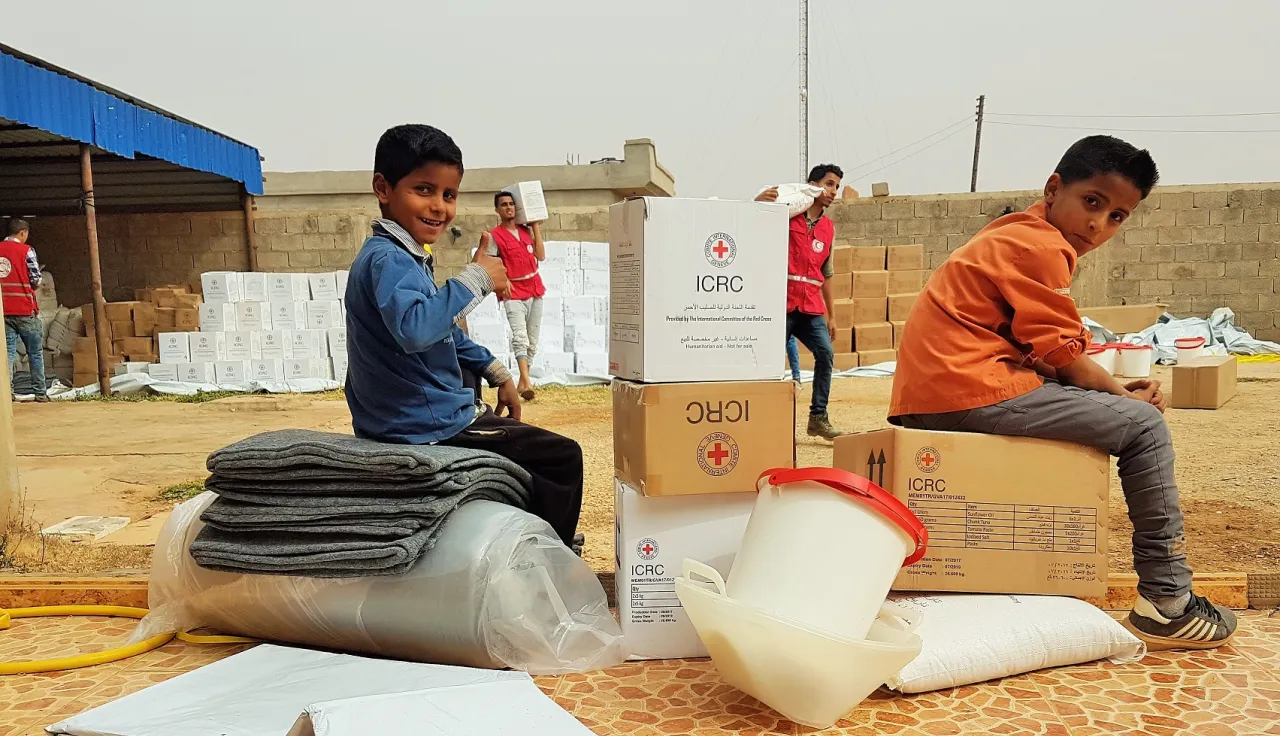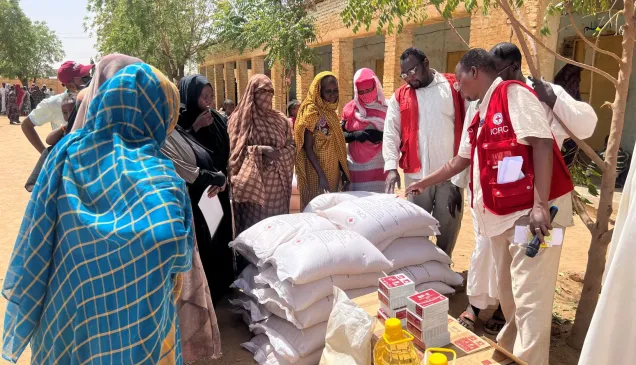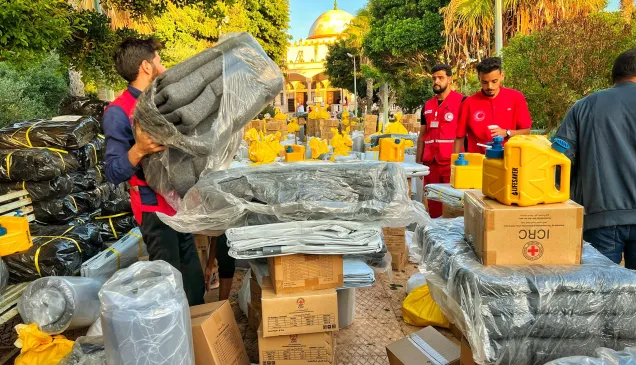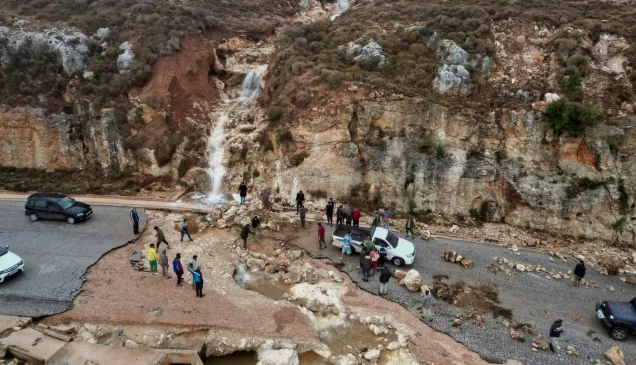Libya: Facts and figures, January – December 2018

The ICRC has striven to help the most vulnerable people. It currently operates from four offices in Libya – Tripoli in the West, Misrata in the Centre, Benghazi in the East and Sabha in the South – and has some 260 staff based mostly inside Libya and some in Tunis.
The ICRC, often in partnership with the Libyan Red Crescent Society (LRCS), responded to several humanitarian emergencies arising in various parts of the country in 2018, as follows:
Food and essential household items
- Assisted over 212,600 displaced people, residents and returnees with food parcels throughout the year – tuna, rice, pasta, cooking oil, beans and others.
- Distributed essential household items to over 183,600 people – tarpaulins, mattresses, blankets, buckets, kitchen sets and hygiene material – to help them improve basic living conditions.
- Handed over to the LRCS essential household items enough for 48,000 people, and around 14,000 food parcels enough to cover the needs of 84,000 people to help respond to emergencies.
Livelihood assistance
- Provided more than 23,700 returnees and other heads of households in different parts of Libya were provided with multi-purpose cash transfers. This allowed them to purchase a variety of items depending on their needs – food, or medicine, or clothing – from local supermarkets and pharmacies. A cash transfer programme training was carried out in Tunis to train 24 ICRC and LRCS staff and volunteers as this programme will be expanded in 2019.
- Launched Micro-Economic Initiatives (MEI) projects in Tripoli, then in Misrata, and later in Benghazi. Over 60 individuals in total received cash grants from the ICRC to start their own small businesses, such as rabbit breeding, taxi service, grain mill and mobile phone maintenance, among others. These projects aimed at helping persons with disabilities and who are treated in ICRC-supported Physical Rehabilitation Centres (PRCs) resume their lives and be reintegrated as active members of society.
- In Tripoli, implemented 24 livelihood programmes following trainings provided on manual professions. About 80% of those who benefited from these programmes were people who had been displaced from Benghazi for years now.
Supporting health facilities
- Donated medical supplies to 52 hospitals and other health facilities across Libya – in Tripoli, Misrata, Benghazi and Sabha. At least half of these also received supplies on a periodical basis.
- Insulin and other medicines were provided to over 80,000 patients in the Misrata, Sabha and Benghazi diabetes centres.
- Structures supported by the ICRC treated nearly 1,000 wounded patients, provided over 300,000 consultations, and vaccinated more than 23,000 children against polio and measles.
- Rehabilitated two primary healthcare centres, one in Benina in Benghazi and another in al-Ghurdah in Sabha.
- Carried out basic first-aid training sessions for more than 390 people from various armed groups, among others.
- Assisted over 900 people with physical disabilities with prostheses and physiotherapy treatment. At present, the ICRC supports three centres in Tripoli, Misrata and Benghazi with material and training.
Access to safe water and better sanitation
- Contributed to the repair of water-supply infrastructures to provide drinking water to more than 130,500 people in Derna and Benghazi.
- In an emergency intervention, jointly with the LRCS, distributed bottled water and restored community latrines, benefiting 600 displaced persons from Derna.
- Assisted the local authorities in sewage disposal and clean-up measures after the floods in Sabha and surrounding areas, improving the lives of over 20,000 people.
- At the Ibn Sina Hospital in Sirte, the water storage capacity has been increased, ensuring reliable water supply to the 250-bed hospital.
- Brought together 24 participants for two trainings, one on Water Quality Monitoring and another on Operation and Maintenance in cooperation with Man-made River Authority and General Company for Water and Sanitation. Additionally, built the capacity of 15 LRCS volunteers from Tripoli, Benghazi and Sabha branches to respond to water and sanitation-related needs.
Reconnecting families, finding the missing
- Rehabilitated a LRCS shelter in Misrata, considerably improving the living conditions of then 24 unaccompanied minors. In December, 12 of those minors were reunited with their families nearly two years on.
- In cooperation with the LRCS, organised over 730 phone or video calls, and transmitted short oral messages and Red Cross messages to people detained in Libya, as well as between families in Libya and their relatives detained abroad, including at Guantanamo Bay Naval Station in Cuba.
- Visited detainees, including migrants, at two places of detention in Misrata to help restore links with their families. Personal parcels sent from their families were transferred to them, and visits were facilitated for some of their families from abroad.
- Issued travel documents to nearly 870 people to facilitate their journey out of Libya.
- Provided clothes, hygiene items and blankets to nearly 540 detainees.
Dignified management of human remains
- Handed over more than 2,500 body bags and 100 protective kits to various entities, including the Forensic Medicine Department under the Ministry of Justice, mortuaries under the Ministry of Health, the Ministry of Interior, and to the Libyan Red Crescent (LRC). Five Portable Autopsy Kits were also provided to the Forensic Medicine Department.
- Installed a new fridge and a new freezer at the Sabha Medical Centre to help double the morgue's body-storage capacity.
- In the framework of strengthening capacities, three workshops for forensic professionals and two training courses on the dignified management of the dead were held for nearly 80 participants, including Libyan forensic practitioners, with participants including police officers, prosecutors, hospital staff, as well as volunteers from the LRCS. Two seminars with military officers addressing the issue of the dead and the missing under International Humanitarian Law (IHL) were also organised, and five forensic professionals were sponsored to attend courses and meetings abroad.
IHL training and promotion
- Tens of workshops and training sessions were held throughout the year in various parts of Libya, as well as in Egypt and in Tunisia, gathering over 950 participants from various circles – different national authorities, military/armed groups, journalist and the LRCS. These focused on IHL and the fundamental rules protecting people during armed conflict and other situations of violence.
Cooperation with the LRCS
- Worked together with the LRCS, contributing to the strengthening of its operational response trough training, financial and material support. In the framework of its commitment to work with the national society, the ICRC signed a Partnership Agreement with the LRCS in December, which will guide both organisations' humanitarian work in Libya.
- Held four workshops in Tunis for over 70 LRCS volunteers and staff to help build their capacities in the fields of the Fundamental Principles of the Red Cross / Red Crescent (RC/RC) Movement, safer access in the field, strategic planning and financial management.
- Organised one RC/RC Movement partnership meeting gathering 16 LRCS representatives, 18 participants from other RC/RC national societies, and four participants from the International Federation. Towards the end of the year, the ICRC supported the LRCS in holding its national meeting, gathering over 40 participants from their Headquarters and branches.



